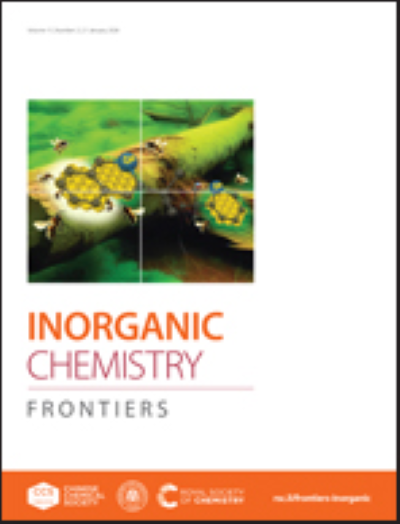Re(V)碳炔配合物与功能化末端炔的复分解反应
IF 6.4
1区 化学
Q1 CHEMISTRY, INORGANIC & NUCLEAR
引用次数: 0
摘要
炔复合反应是合成化学中的基础反应。然而,末端炔的复合反应仍然是一项罕见的成就,无论是催化还是化学计量。为了克服这一挑战,我们探索了非碳炔配合物与末端炔的反应。发现d2 Re(V)碳炔配合物,特别是Re(CR)Cl2(PMePh2)3,可以与一系列末端芳基和脂肪炔(HCCR ‘)发生化学计量反应,生成取代碳炔配合物Re(CR ’)Cl2(PMePh2)3和HCCR。这些化学计量反应与官能团如醛、醇、酯,甚至无保护的羧酸相容。密度泛函理论(DFT)计算表明,取代碳炔配合物的形成在热力学和动力学上都比甲基炔配合物更有利。本文章由计算机程序翻译,如有差异,请以英文原文为准。

Metathesis reactions of Re(V) carbyne complexes with functionalized terminal alkynes
Alkyne metathesis is a cornerstone reaction in synthetic chemistry. However, metathesis of terminal alkynes remains a rare accomplishment, both catalytically and stoichiometrically. To overcome this challenge, we explored reactions of non-d0 carbyne complexes with terminal alkynes. It was found that d2 Re(V) carbyne complexes, specifically Re(![[triple bond, length as m-dash]](https://www.rsc.org/images/entities/char_e002.gif) CR)Cl2(PMePh2)3, can undergo stoichiometric metathesis with a range of terminal aryl and aliphatic alkynes (HC
CR)Cl2(PMePh2)3, can undergo stoichiometric metathesis with a range of terminal aryl and aliphatic alkynes (HC![[triple bond, length as m-dash]](https://www.rsc.org/images/entities/char_e002.gif) CR′), yielding substituted carbyne complexes Re(
CR′), yielding substituted carbyne complexes Re(![[triple bond, length as m-dash]](https://www.rsc.org/images/entities/char_e002.gif) CR′)Cl2(PMePh2)3 and HC
CR′)Cl2(PMePh2)3 and HC![[triple bond, length as m-dash]](https://www.rsc.org/images/entities/char_e002.gif) CR. These stoichiometric metathesis reactions are compatible with functional groups such as aldehydes, alcohols, esters, and even unprotected carboxylic acids. Density Functional Theory (DFT) calculations indicate that the formation of substituted carbyne complexes is both thermodynamically and kinetically more favorable than that of methylidyne complexes.
CR. These stoichiometric metathesis reactions are compatible with functional groups such as aldehydes, alcohols, esters, and even unprotected carboxylic acids. Density Functional Theory (DFT) calculations indicate that the formation of substituted carbyne complexes is both thermodynamically and kinetically more favorable than that of methylidyne complexes.
![[triple bond, length as m-dash]](https://www.rsc.org/images/entities/char_e002.gif) CR)Cl2(PMePh2)3, can undergo stoichiometric metathesis with a range of terminal aryl and aliphatic alkynes (HC
CR)Cl2(PMePh2)3, can undergo stoichiometric metathesis with a range of terminal aryl and aliphatic alkynes (HC![[triple bond, length as m-dash]](https://www.rsc.org/images/entities/char_e002.gif) CR′), yielding substituted carbyne complexes Re(
CR′), yielding substituted carbyne complexes Re(![[triple bond, length as m-dash]](https://www.rsc.org/images/entities/char_e002.gif) CR′)Cl2(PMePh2)3 and HC
CR′)Cl2(PMePh2)3 and HC![[triple bond, length as m-dash]](https://www.rsc.org/images/entities/char_e002.gif) CR. These stoichiometric metathesis reactions are compatible with functional groups such as aldehydes, alcohols, esters, and even unprotected carboxylic acids. Density Functional Theory (DFT) calculations indicate that the formation of substituted carbyne complexes is both thermodynamically and kinetically more favorable than that of methylidyne complexes.
CR. These stoichiometric metathesis reactions are compatible with functional groups such as aldehydes, alcohols, esters, and even unprotected carboxylic acids. Density Functional Theory (DFT) calculations indicate that the formation of substituted carbyne complexes is both thermodynamically and kinetically more favorable than that of methylidyne complexes.
求助全文
通过发布文献求助,成功后即可免费获取论文全文。
去求助
来源期刊

Inorganic Chemistry Frontiers
CHEMISTRY, INORGANIC & NUCLEAR-
CiteScore
10.40
自引率
7.10%
发文量
587
审稿时长
1.2 months
期刊介绍:
The international, high quality journal for interdisciplinary research between inorganic chemistry and related subjects
 求助内容:
求助内容: 应助结果提醒方式:
应助结果提醒方式:


